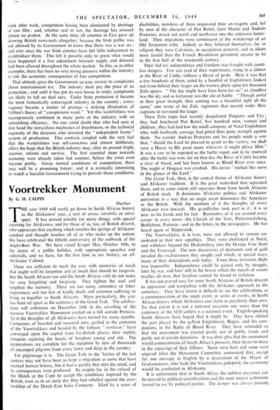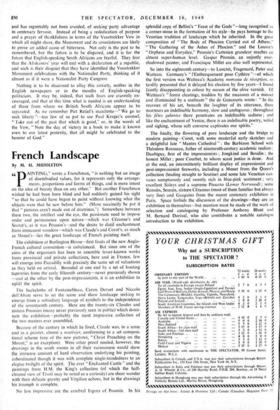Voortrekker Monument
By G. H. CALPIN Durban
THE year 1949 will surely go down in South African history as the Afrikaners' year, a sort of annus mirabilis in retro- spect. It has proved notable for many things, with special weaning for Afrikaners, and for those of us, too, of British descent, who appreciate that anything which touches the springs of Afrikaner conduct and thought touches all of us who make up the nation. We have celebrated the fiftieth anniversary of the outbreak of the Anglo-Boer War. We have raised Kruger Day, October 10th, to the status of a public holiday, with appropriate speeches and editorials, and we have, for the first time in our history, an all- Afrikaner Cabinet.
These are sufficient to mark the year with memories of much that might well be forgotten and of much that should be forgiven. But the South African sun and the South African veld do not make for easy forgetting and forgiving. They tighten the soul and lengthen the memory. There are too many reminders of bitter experiences and too few of kindly deeds and common suffering to bring us together as South Africans. More particularly, the year has been set apart as the centenary of the Great Trek. The celebra- tions will culminate on December 16th in the unveiling of the massive Voortrekker Monument erected on a hill outside Pretoria. To it the thoughts of all Afrikaners have turned for many months.
• Companies of bearded and mounted men, garbed in the costumes of the Voortrekkers and headed by the famous " vierkleur," have converged upon the capital from far-distant places, their nightly outspans rejoicing the hearts of burghers young and old. The preparations are complete for the reception by tens of thousands of encamped pilgrims from every town and dorp in the country.
For pilgrimage it is. The Great Trek in the 'forties of the last century may not have been as large a migration as some that have marked human history, but it had a quality that stirs the mind, and its consequences were profound. Its origins lay in the refusal of the Dutch at the Cape to accept the conditions imposed by the British, even as in an early day they had rebelled against the over- lordship of the Dutch East India Company. Irked by a score of
disabilities, members of them inspahned their ox-wagons and, led by men of the character of Piet Retie., Gert Maritz and Andries Pretorius, struck out north and north-cast into the unknown hinter- land. Their migrations were reminiscent of the wanderings of an Old Testament tribe. Indeed, so they believed themselves, for in religion they were Calvinists, in occupation pastoral, and in idiom more feudal than the French Revolution permitted anyone to be in the first half of the nineteenth century.
Their bid for independence and freedom was fraught with count- less dangers. Few can read of their experiences, rising to a climax at the River of Cattle, without a thrust of pride. Here it was that a few hundreds of them, aided by a handful of Englishmen, looked out from behind their laager on the treeless plain upon ten thousand Zulu spears. "The day might have been born for us," so cloudless was the sky and so fortunate was the site of battle. " Though awful in their great strength, their coming was a beautiful sight all the same," one wrote of the Zulu regiments that moved under their captains to surround the laager.
These Zulu impis had recently despoliated Potgieter and Uys ; they had butchered Piet Relief, five hundred men, women' and children ; they had laid low the small company of Natal Englishmen who, with foolhardy courage, had pitted their puny strength against them. No wonder Andries Pretorius and his people made a vow that, " should the Lord be pleased to grant us the victory, we shall raise a House to His great name wherever it might please Him." It was a vow to be repeated as the battle raged, and to be renewed after the battle was won, for on that day the River of Cattle became a river of blood, and has been known as Blood River ever since. The might of Dingaan was crushed. His terror " melted like snow in the glance of the Lord."
The Great Trek, then, is the central theme of Afrikaner history and Afrikaner tradition. It is the great watershed that separated them, and to some extent still separates them from South Africans of British stock. It dominates Afrikaner politics and Afrikaner patriotism in a way that no single event dominates the American or the British. With the mention of it the thoughts of every Afrikaner turn inwards. His grandfather took part in it ; it is as near as his hands and his feet. Reminders of it are around every corner in every town—the Church of the Vow, Pietermaritzburg, Bethlehem, Pretoria—and in the letters to the newspapers. He has heard again of Slagtersnek.
The Voortrckkers, it is true, were not allowed to remain un- molested in their new republics. They were challenged in Natal, and withdrew beyond the Drakensberg into the Orange Free State and the Transvaal. The new discoveries of diamonds and of gold invaded the exclusiveness they sought and which, in special ways, many of their descendants seek today. From these invasions flight was impossible. Independence could be gained only by struggle, later by war, and later still in the lesson which the march of events teaches all men, that freedom cannot be found in isolation.
It has not proved easy for some South Africans of British descent to appreciate and sympathise with the Afrikaner approach to the centenary. They have found it difficult to sec the celebrations as a commemoration of the single event, or series of events, in South African history which Afrikaners can claim as peculiarly their own. To that extent it is not a national occasion any more than the centenary of the 1820 settlers is a national event. English-speaking South Africans have hoped that it might be. They have related the part played by the gallant Englishman, Biggar, and his com- panions, in the Battle of Blood River They have reminded us that the monument was erected partly out of public funds and partly out of private donations. It was their plea that the monument would commemorate all South Africa's pioneers, their desire to share in the rejoicings of their fellows. Some were hurt and some were angered when the Monument Committee announced that, except for one message in English by a descendant of the Mayor of Grahamstown, who bade the Voortrekkers godspeed, the ceremony would be conducted in Afrikaans.
It is unfortunate that in South Africa the noblest occasions can be marred by political considerations and the most sincere sentiments turned to use by political parties. The danger was always present,
and has regrettably not been avoided, of seeking' party advantage in centenary fervour. Instead of being a rededication of purpose and a prayer of thankfulness in terms of the Voortrekker Vow in which all might share, the Monument and its associations are likely to prove an added cause of bitterness. Not only is the past to be remembered, but the future is to be disposed, and it is for the future that English-speaking South Africans are fearful. They fear that the Afrikaners' year will end with a declaration of a republic, and such is their disquiet that they have identified the Voortrekker Monument celebrations with the Nationalist Party, thinking of it almost as if it were a Nationalist Party Congress.
Nothing is to be discerned to allay this anxiety, neither in the English newspapers or in the mouths of English-speaking politicians. It may be, indeed, that such fears are cravenly en- couraged, and that at this time what is needed is an understanding of those from whom we British South Africans appear to be separated. As we remember Pict Retiefs manifesto—" We go to seek liberty "—too few of us put to use Paul Kruger's counsel, " Take out of the past that which is good," or, in the words of the Vow, " Note the day of victory in a book to make it known even to our latest posterity, that all might be celebrated to the honour of God."



































 Previous page
Previous page